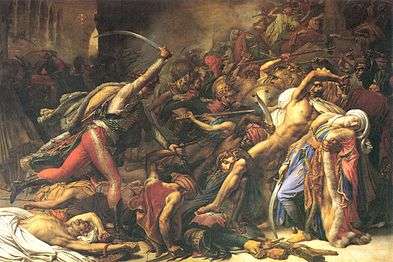Revolt of Cairo
| Revolt of Cairo | |||||||
|---|---|---|---|---|---|---|---|
| Part of the Campaign of Egypt | |||||||
 "Revolt in Cairo on 21 October 1798" by Girodet-Trioson, 1810 | |||||||
| |||||||
| Belligerents | |||||||
|
|
| ||||||
| Commanders and leaders | |||||||
|
General Bonaparte General Dupuy † Thomas-Alexandre Dumas | |||||||
| Casualties and losses | |||||||
|
300 killed[1] 800 dead or wounded | 5,000–6,000 dead or wounded | ||||||
The Revolt of Cairo occurred on 21–22 October 1798 against the French occupation of Egypt led by Napoleon Bonaparte.[2]
The revolt
In 1798, Napoleon led the French army into Egypt, swiftly conquering Alexandria and Cairo. However, in October of that year, an uprising by the people of Cairo surprised the French forces. While Bonaparte was in old Cairo, the city's population was spreading weapons around the streets and fortifying strongpoints, especially at the Great Mosque. The French commander, General Dupuy, was murdered, as well as Bonaparte's Aide-de-camp Joseph Sulkowski. Excited by the sheikhs and imams, the Egyptians swore by the Prophet to exterminate all Frenchmen and any Frenchman they met – at home or in the streets – was mercilessly killed. Crowds rallied at the city gates to keep out Bonaparte, who was repulsed and forced to take a detour to get in via the Boulaq gate.
The French army's situation was critical – the British were menacing coastal towns, Murad Bey was still in the field in Upper Egypt, and generals Menou and Dugua were only just able to hold down Lower Egypt. The Arabs and the Egyptian peasants had common cause with those rising against the French in Cairo – the whole desert was in arms. A manifesto of the Great Lord was published widely throughout Egypt, stating:
| “ | The French people are a nation of stubborn infidels and unbridled rascals... They look upon the Koran, the Old Testament and the New Testament as fables... Soon, troops as numerous as they are formidable will advance on us by land, at the same time ships of the line as high as the mountains will cover the surface of the seas... If it please God, it is reserved for you to preside over their [ie the French's] entire destruction ; as dust is scattered by the wind, there will not remain a single vestige of these infidels : for the promise of God is formal, the hope of the wicked man will be deceived, and the wicked men will perish. Glory to the Lord of the worlds! | ” |
The French responded by setting up cannons in the Citadel and firing them at Azhar and the areas around it. During the night, the French had forces go into the area and destroy the barricades. The cavalry forced their way into the Azhur and killed an unknown number of people.[3] Via Napoleon's orders the Arabs were beaten back into the desert and the artillery was turned back on the rebel city. Bonaparte personally hunted down the rebels from street to street and forced them to concentrate in the Great Mosque. Bonaparte said that "He [i.e God] is too late – you've begun, now I will finish!". He then immediately ordered his cannon to open fire on the Mosque. The French broke down the gates and stormed into the building, massacring the Egyptians inside, leaving 5,000 to 6,000 dead or wounded.
Back in absolute control of Cairo, Bonaparte sought out the authors and instigators of the revolt. Several sheikhs and many Turks or Egyptians were convicted of participation in the plot and executed. To complete his punishment, the city was hit by a high tax and its divan was replaced by a military commission. To negate the effects of the Great Lord's firman, the French posted a proclamation in all the cities of Egypt, ending in the words:
| “ | Stop founding your hopes on Ibrahim and Mourad, and put your trust in He who has empires in his discretion and who creates men | ” |
References
Sources
- Chandler, David G. (1966). The Campaigns of Napoleon. New York: Macmillan. ISBN 978-0025236608.
- Pigeard, Alain (2004). Dictionnaire des batailles de Napoléon: 1796-1815, Paris: éditions Tallandier. ISBN 978-2-84734-073-0